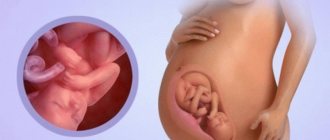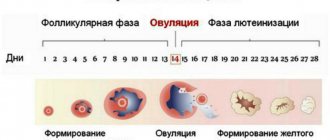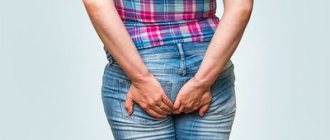Make an appointment Anorectal varicose veins are an unpleasant and common ailment. Quite often it occurs in women, and the course of the disease is complex - hemorrhoids worsen during menstruation, thereby worsening the general condition. Menstruation and hemorrhoids are interconnected, this is caused by physiological processes. Let’s look in more detail at what the changes are related to and how to improve your well-being.
If external hemorrhoids are in a severe stage, treatment must be prescribed immediately.
Causes of exacerbation of hemorrhoids during menstruation
Hemorrhoids are a proctological disease associated with dilation of the veins of the rectum and stagnation of blood in them. Even young girls who have given birth to their first child and have problems bearing the baby complain of exacerbation of hemorrhoids during menstruation.
Why does inflammation occur and hemorrhoids appear before menstruation? During critical days, the volume of blood in a woman’s body increases. Accordingly, the flow of blood cells in the hemorrhoidal veins increases. They, in turn, expand, forming nodes. The latter increase, creating unpleasant and painful sensations.
Due to hormonal imbalance, most girls have an increased appetite. Some begin to actively consume sweets, others - sour, salty, spicy. Against this background, intestinal upset occurs. It is important to remember that constipation or diarrhea directly affects the condition of hemorrhoidal vessels, as it provokes their expansion.
The main causes of exacerbation of the disease also include:
- smoking, alcoholism;
- dysfunction of the digestive system;
- excessive and heavy physical activity;
- genetic predisposition to varicose veins;
- low physical activity;
- excess body weight.
Hemorrhoids and menstruation are directly related to each other. Therefore, it is important to learn how to reduce discomfort during illness and try to prevent the formation of an inflammatory process in the anus.
Why do hemorrhoids worsen during menstruation?
The first step is to figure out why hemorrhoids worsen during menstruation. Hemorrhoids are enlargement and dilation of venous vessels. They are located in the rectal cavity, next to the rectal canal.
During menstruation, hemorrhoids worsen, which is caused by the preparation of the body, as a result of which the hormonal levels change, and blood actively flows to the pelvic area. All this leads to the following changes:
- When hormones are imbalanced, immunity decreases and health worsens. As a result, infection of hemorrhoids with pathogens is high.
- Cavernous formations fill with blood, thereby increasing in size. Inflammation occurs and the lumps fall out of the internal cavity.
- Blood flow increases in the genitals, and therefore the pressure on the lower part of the digestive tract also increases.
- Before the start of the menstrual cycle, women's appetite increases. Many people begin to eat a lot of sweet, salty, fried, smoked foods. All this food causes constipation or diarrhea, which is another reason why hemorrhoids worsen during menstruation.
After the menstrual cycle, hemorrhoids cease to bother women, in addition, acute symptoms decrease. However, such improvements are often misleading. It is important to understand that before the next menstruation, hemorrhoids will appear again.
How does exacerbation of hemorrhoids manifest during menstruation?
The disease during menstruation is quite severe. Why and by what signs does inflamed hemorrhoids indicate the onset of menstruation?
Symptoms of the disease are divided into 4 degrees:
- The first and second phases do not allow you to diagnose the problem yourself at home. During bowel movements, minor blood spots may appear, with accompanying sharp pain. In medicine, the stages are called internal hemorrhoids;
- the third and fourth phases are the external form of the disease, in which hemorrhoids begin to enlarge and the risk of them falling out of the anus increases.
Important! At stages 1–4, hemorrhoidal bleeding may occur.
The following general symptoms are characteristic of hemorrhoids:
- Painful sensations when going to the toilet.
- The presence of blood and mucous discharge in the stool.
- Severe itching, discomfort in the anus and perineum, which intensifies during menstruation.
- Swelling and formation of nodes in the anus.
The manifestation of the above symptoms of the disease is influenced by poor circulation in the rectum, as well as improper functioning of the intestinal muscles.
Hemorrhoids in women: causes, symptoms and treatment methods
Hemorrhoids are a pathological change in hemorrhoidal “bumps”, which must be treated with an integrated approach: effective drugs to relieve the symptoms of internal and external nodular seals and suppositories. The diagnosis is based on circulatory disorders, in which blood moves not only from bottom to top, but also in the opposite direction. The valve flaps in the dilated vein cannot cope with the volume of fluid, they stretch and do not prevent its reverse flow. This creates internal stagnation of blood, the walls of the veins become fragile and are easily injured. The inflammatory process provokes pain, itching, burning. When defecating, the nodes may bleed and fall out.
The internal and external nature of the course of the disease are distinguished. Internal hemorrhoids are located in the distal part of the rectum, external hemorrhoids are localized in the anal area. Treatment of the disease directly depends on its location, the severity of the symptoms and the patient’s individual tolerance to the drug. The price of the medicine will depend on how effectively it affects the condition of blood vessels, and also has a good review from customers.
Signs of the disease in women
Hemorrhoidal “bumps” can be effectively treated at any stage of the disease. The chronic form most often develops in women after 30 years of age and requires immediate treatment: medications, suppositories, ointments. However, a sedentary lifestyle, bad habits and poor heredity quickly reduce the age threshold. Stagnation of blood in the venous nodes of the rectum can also be caused by:
- Chronic constipation and gastrointestinal problems - concomitant problems need to be treated in parallel;
- Heavy physical activity;
- Fatty and spicy foods;
- Alcohol abuse;
- Gynecological diseases that quickly develop into chronic ones.
Drugs for the treatment of internal and external hemorrhoids relieve symptoms of the disease. To remove the key risk factor, you need to adjust your lifestyle, develop an effective good nutrition schedule, include moderate exercise and breathing practices, and take medications to prevent the disease.
Symptoms and complications
It makes no sense to treat the first stages of the disease, because they are practically asymptomatic. Slight discomfort during bowel movements or itching does not cause any particular suspicion in women. With chronic or external hemorrhoids, pain is practically absent. The drugs relieve swelling and prevent the formation of blood clots. In the acute form of the disease, the list of symptoms is as follows:
- Severe sharp pain in the anal area;
- Frequent constipation;
- Burning and itching;
- Mucous discharge;
- Inflammation of hemorrhoids, which can cause them to bleed.
With hemorrhoidal syndrome during pregnancy, a deterioration in the woman’s general well-being may occur. The problem is worsened by the fact that not all medications are suitable during gestation and will effectively cope with their task. In this case, you must definitely consult with a good specialist and prescribe competent medication treatment.
How to prevent worsening hemorrhoids associated with menstruation
Hemorrhoids appear constantly before menstruation, then it’s worth thinking about how to reduce the pain. Timely preventive measures will prevent the acute development of the disease. Expert recommendations:
- First of all, you need to pay attention to nutrition. It is recommended to exclude alcoholic, carbonated drinks, smoked foods, spicy, salty, pickled and fried foods from the diet. Add more vegetables, black bread, dried fruits. Meals should be fractional, that is, the portions are small, and the frequency of consumption is up to 5 times a day. Increase your intake of liquid foods. Experts recommend giving preference to soups rather than main courses. Drink clean, filtered liquid from 2 liters per day.
- When working sedentarily, be sure to do a gymnastic warm-up. Every 30 minutes you should do certain exercises or just walk at a calm pace.
- You should choose a work chair with a hard surface.
- It is worth giving up tight clothes - jeans, short skirts, tight trousers, etc.
- Before and after menstruation, lifting heavy objects is prohibited.
- A few days before and during your period, you should not visit sports and fitness rooms. Yoga is allowed.
- Follow the rules of intimate hygiene.
- Replace toilet paper with simple wet wipes.
Preventive measures to prevent exacerbation are simple and easy to understand. If you follow them, it will not be difficult to alleviate the condition during the inflammatory process.
What to do if an exacerbation occurs during such a period
Since hemorrhoids appear during menstruation, it is worth knowing how to treat them. Treatment in this case is practically no different from standard therapy.
There are a number of rules that must be followed if signs of hemorrhoids appear in women during the menstrual cycle:
- Cold therapy is prohibited. Do not use homemade candles or ice lotions.
- Physical activity is kept to a minimum. It is not recommended to lift weights or play sports. The maximum that is allowed for symptoms of hemorrhoids in women is light exercise.
- If you monitor your cycle, you can anticipate exacerbations in advance and prevent them. For 2-3 days, exclude everything spicy, sweet, and fatty from your diet; you need to drink a lot.
- Since constipation is one of the causes of hemorrhoids in women, consume as much fiber as possible.
- If menstruation is accompanied by pain, it would be useful to take painkillers. For example, “No-shpa”, “Drotaverine”, “Nurofen”.
These rules are simple, so following them is not so difficult. If you know the causes of hemorrhoids in advance, then treatment for women will be easier, and most importantly, it can be prevented.
How to treat exacerbation during menstruation
Signs of hemorrhoids can be relieved using 2 methods: surgical and drug therapy. In addition, you need to start losing excess weight and impose restrictions on your previous lifestyle. It is also worth removing the factors that provoke the development of the disease, thereby enhancing the effect of the medicinal treatment. Let's look at each type in more detail.
Drug therapy
For effective treatment, it is imperative to combine tablet preparations with anal suppositories, ointments or gels for hemorrhoids.
| Troxevasin | Available in capsule and gel form. The active substance is troxerutin. Capsules. The daily dosage is 300 mg (initial stage), and 600 mg for advanced forms. The course of admission is 21-28 days. Consumed during meals with plenty of water. Gel. Apply a thin layer to the affected area 2 times a day. Recommended to combine with capsules or candles. |
| Detralex | Release form: tablets. Active substances: diosmin, hesperidin. In acute cases of the disease, take 6 capsules per day for 4 days. Then the dosage is reduced to 4, taking only 3 days. |
| Venarus | Available in tablet form. Active substance – diosmin, hesperidin. Used for acute and chronic hemorrhoids. It is used similarly to the drug “Detralex”. |
| Phlebodia 600 | The active substance is diosmin. Release form: capsules. Use 2 to 3 tablets per day for 1 week. If necessary and in consultation with your doctor, you may subsequently take 1 tablet for 1–2 months. |
| Anuzol | Rectal suppositories. They disinfect and help quickly heal microcracks. The daily norm does not exceed more than 7 pcs. |
| Relief | Suppositories and ointment for the treatment of hemorrhoids. They relieve the inflammatory process in a short period of time. Anesthetizes and heals hemorrhoids. Daily dosage: 4 suppositories. |
| Natalsid | Rectal suppositories. Prevent blood circulation, relieve swelling and inflammation, promote rapid healing of wounds. Use 2 times a day, 1 suppository after hygiene procedures. The course of treatment is from 1 to 2 weeks. |
To relieve pain from hemorrhoids during menstruation, it is recommended to additionally take painkillers - Nurofen, Nimesil. Doctors prohibit the use of the antispasmodic No-Shpa, as it increases bleeding.
Medicines for hemorrhoids in women: list, prices, dosage
The effective course of treatment will depend on the choice of treatment tactics. Non-surgical methods of therapy require an integrated approach, which includes taking medications, preventive measures, physiotherapeutic procedures and local medications - ointments, gels, suppositories. Let's look at the most effective medications in the fight against hemorrhoids.
- Venotonics with angioprotective properties.
The list of drugs is headed by capsules based on bioflavonoids “Phlebodia” and “Detralex”. They are available without a doctor's prescription and have a similar principle of action. They are used for the prevention and relief of symptoms in external and internal forms of the disease. The active substance diosmin helps to increase venous tone, strengthen the walls of blood vessels, and eliminate congestion.
"Phlebodia" effectively manifests itself as an anti-inflammatory agent that can be used to treat the disease at any stage. Tablets are taken in a course of 1-2 times a day. The inexpensive price of tablets makes them more accessible and popular.
- Rectal suppositories.
An effective and efficient medication with good anti-inflammatory and immunostimulating effects is Methyluracil suppositories. With their help, you can treat the disease in the initial stages with an effectiveness of up to 95%. The minimum price is another advantage.
Proctazan is a good herbal-based medicinal suppository. Relieves pain, itching, burning. If the “bump” bleeds, the suppository promotes rapid healing of the wound. The price is also in the middle segment. For severe pain and swelling, effective rectal suppositories are also often prescribed at a good price - Procto-glivenol, Relief. In the event that the lesion is bleeding, you can use suppositories that effectively stop bleeding - Anestezol.
Surgical intervention
The surgical technique involves minimally invasive operations. It is not carried out during menstruation; you need to wait until the end.
This method of treatment includes the following:
- Damage to hemorrhoids with liquid nitrogen.
- Filling the veins with a medicine to shrink them.
- Quick removal of affected areas of the rectum.
- When using a latex ring, the cones are removed.
Treatment during menstruation with folk remedies
During menstruation, it is allowed to use traditional treatment. It is important to remember that during an exacerbation it is prohibited to use warm and cold procedures.
The recipes described below are highly effective and safe to use:
- To eliminate constipation, dissolve 50 g of honey or 15 ml of castor oil in 200 ml of warm boiled water.
- It is recommended to make rectal suppositories from fresh potatoes. To do this, rinse the tuber thoroughly, peel and pour over boiling water. Using a knife, cut a candle with a diameter of 15 mm and a length of 3 to 5 cm. The shape is torpedo-shaped. This type of product perfectly helps eliminate internal knots. Use once a day at night, after hygiene procedures. The course of treatment is 10 days. You need to cut out candles as needed, but do not prepare them in advance.
- Peel the onions. Cut the head into 2 equal parts. Place in a suitable saucepan, fill with water and cook until soft. Carefully remove the onion, cool to room temperature and apply to the cones overnight, carefully securing with gauze and adhesive tape. Treatment is carried out before the cessation of menstruation and 6 days after.
- Place chamomile in a thermos and pour 250 ml of boiling water. Leave for 2 hours, then strain. Rinse the sore spot with infusion after each trip to the toilet. Use a homeopathic remedy until the problem is completely eliminated.
Doctors' opinion
Coloproctologists say that most women are embarrassed to go to the hospital with this problem. But it is worth remembering that if the disease is prolonged, it will be more difficult to treat in the future. Experts do not recommend self-medication and be sure to consult, including traditional medicine prescriptions.
It is important to remember that alternative medicine may not always give positive results, and in some cases even harm and worsen the patient’s condition. Therefore, you should definitely adhere to the prescribed medication treatment. Self-medication is prohibited.
Exacerbation of hemorrhoids before menstruation gives a woman a lot of discomfort. The process of menstruation itself is quite painful, and then there is the unpleasant disease. During illness, quality of life deteriorates significantly over several days. Be sure to take preventive measures to prevent the inflammatory process.








